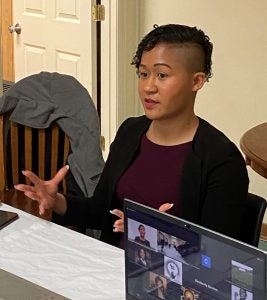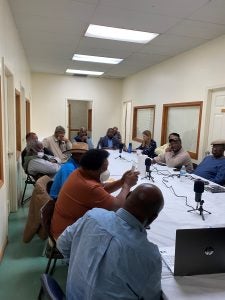How credit and climate change collide for Black farmers in Georgia
Earlier this week, the Federation of Southern Cooperatives/Land Assistance Fund hosted a listening session for its Black farmer-members in Georgia in collaboration with Environmental Defense Fund. The federation is a nonprofit cooperative association of Black farmers, landowners and cooperatives based primarily in the Southern states. In the listening session, 15 farmers discussed their ongoing concerns about access to credit and climate change impacts, as well as how coalition building and advocacy can support them in continuing to farm.
As senior director of climate-smart agriculture for EDF, I participated in the listening session and interviewed Dãnia Davy, director of land retention and advocacy for the federation, following the discussion.
What were the biggest concerns farmers raised during the listening session?
The group shared that debt relief and access to credit continue to be their top concerns. The long-documented and acknowledged racist policies of denying and delaying loans prevented Black farmers from operating successful farm businesses, forcing foreclosures and continuing the shameful legacy of Black land loss in the U.S.

One year ago, Section 1005 of the American Rescue Plan was signed into law, which was designed to provide debt relief to Black farmers and other farmers of color, who have long suffered systemic, harmful discrimination by the U.S. Department of Agriculture. The debt relief program is currently stalled in court because the federation filed a motion to intervene to allow the voices and interests of our member-farmers to be heard as part of that case.
In the listening session, the farmers described the impact of the delayed debt relief. Several of them stand to lose their farms or face other financial hardship if the debt relief program does not proceed as planned by USDA.
How do Black farmers’ concerns about access to credit connect to climate change?
When we asked the farmers about the impacts of climate change, many said they are just trying to stay on their farms and maintain what they have. It is challenging for them to think beyond the immediate threats of lack of access to credit and the stalled debt relief. That said, they are noticing changes in the climate, and those impacts compound the other financial challenges they face.

One farmer described how Hurricane Michael blew his cotton flat onto the ground and made it impossible to harvest. The disaster relief he received was insufficient for him to recover financially, and this compounded his challenges in repaying his debt.
Another farmer who owns an urban produce farm in Atlanta described how increased temperatures are allowing him to grow tropical fruits such as bananas, which would never have been possible previously. He advocated for increased research in Georgia on the types of crop shifts that will be needed to adapt to a changing climate.
Some of the farmers shared that they didn’t know what impact their small farms can have on the global challenge of climate change, and their concern about the costs associated with transitioning to climate-smart practices that build resilience and reduce climate impacts. Financial information on how the transition to climate-smart agriculture can occur profitably will be essential to supporting these farmers as they consider their options and select what works best for their farms.
How can these farmers’ perspectives influence upcoming farm bill discussions and other policy negotiations?
The federation is committed to supporting Black farmers, landowners and cooperatives by advocating for policies and programs that fit their unique needs. There are two main ways we strive to make that happen: coalition building and enabling policymakers to hear directly from farmers.
The federation and EDF are both members of the Food and Agriculture Climate Alliance, along with nearly 100 other organizations, to jointly guide the development of federal climate legislation that impacts agriculture. The alliance’s bipartisan orientation is an important example of a coalition that doesn’t get boxed into political parties but instead identifies common ground and considers how the climate affects us all. This is incredibly valuable as we begin 2023 farm bill negotiations.
The federation also recently formed an Advocacy Institute, which will help build the skills of 70 Black farmers in bringing their personal experiences and stories to policy advocacy. Several farmers at the listening session signed up to take part in the Advocacy Institute, and we will be recruiting other members from the other Southern states we serve.
Ultimately, including the voices of Black farmers is what’s needed to develop policies that address the continued disparities in agriculture and support them in navigating the changing climate.
How can readers connect with the federation’s work?
We are really excited about continuing the momentum from our very successful Georgia farmers listening session. The federation’s Advocacy Institute will be hosting monthly listening sessions in each state we work in to help our members develop our farm bill 2023 priorities. Participation in these listening sessions will be open to farmers, landowners, cooperatives and supporters who want to better understand and amplify our members’ experiences and needs. The May listening session will focus on our Mississippi members.
We also share regular updates on the federation’s agroforestry, climate and environmental work on Twitter, Instagram, Facebook and our website. We also distribute monthly episodes of our podcast, the Federation Conversation, to give listeners the opportunity to better understand and support the work of our members and staff.
Want to learn more? Listen to Dãnia’s interview with my colleague Ben Thomas, EDF’s senior policy director, on the Federation Conversation podcast.










